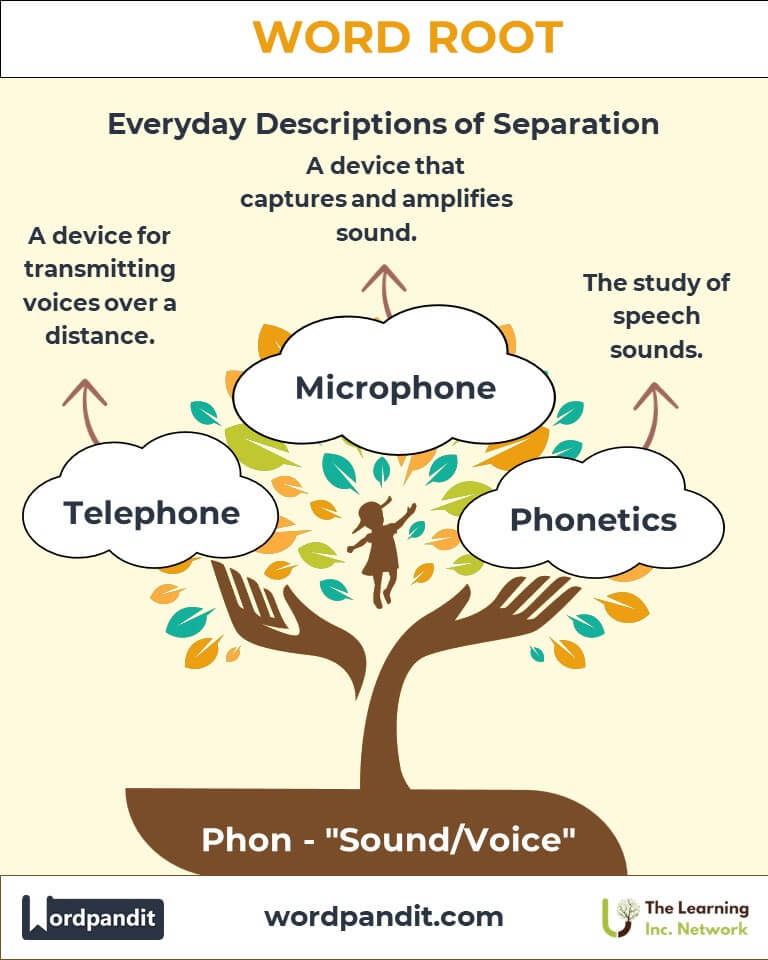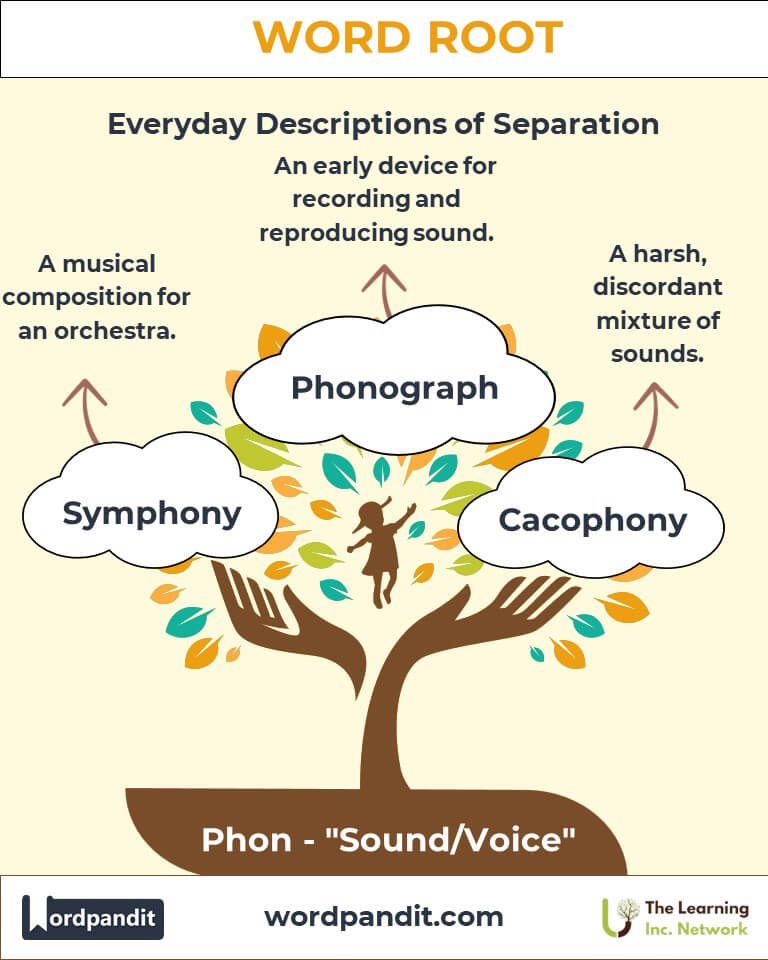Phon: The Root of Sound in Language, Science, and Technology
Byline:
Dive into the fascinating world of the root "phon," derived from the Greek word phōnē, meaning "sound" or "voice." This linguistic cornerstone resonates through everyday language and specialized fields, giving rise to words like "telephone" and "symphony," and highlighting the centrality of sound in human expression and communication.

Table of Contents
- Introduction: The Resonance of "Phon"
- Etymology and Historical Journey
- Mnemonic: Unlocking the Power of "Phon"
- Common "Phon"-Related Terms
- "Phon" Through Time
- "Phon" in Specialized Fields
- Illustrative Story: "Phon" in Action
- Cultural Significance of "Phon"
- The "Phon" Family Tree
- FAQs about the "Phon" Word Root
- Test Your Knowledge: "Phon" Mastery Quiz
- Conclusion: The Living Legacy of "Phon"
Introduction: The Resonance of "Phon"
What’s the connection between a telephone, a symphony, and a phonograph? The answer lies in their shared root: phon, meaning "sound" or "voice." Pronounced "fawn," this Greek root captures the essence of auditory phenomena and their role in human connection. From music to telecommunications, "phon" reflects the power and beauty of sound.

Etymology and Historical Journey
The root phon originates from the Greek word phōnē, meaning "voice" or "sound." Ancient Greek philosophers used it to describe both spoken words and musical tones. Over time, phon traveled through Latin and into English, appearing in words related to sound, speech, and communication. Technological advances in the 19th and 20th centuries, such as the phonograph, brought new prominence to this root.
Mnemonic: Unlocking the Power of "Phon"
Imagine a symphony orchestra performing a magnificent piece. Each instrument contributes its unique phōnē, harmonizing to create a breathtaking soundscape.
Mnemonic:
"Phon brings the phone, the tone, and the symphony home!"
Common "Phon"-Related Terms
- Telephone: A device for transmitting voices over a distance.
Example: "She used the telephone to call her friend across the country." - Symphony: A musical composition for a full orchestra.
Example: "The symphony’s performance captivated the audience." - Phonograph: An early device for recording and reproducing sound.
Example: "Thomas Edison’s phonograph revolutionized music playback." - Phonetic: Relating to the sounds of speech.
Example: "Phonetic spelling helps children learn how to pronounce words." - Cacophony: A harsh, discordant mixture of sounds.
Example: "The traffic created a cacophony of honks and engine roars."
"Phon" Through Time
- Phonograph (1877): Introduced by Thomas Edison, this invention allowed sound to be recorded and played back, marking a leap in audio technology.
- Symphony: Originating in ancient Greece as symphonia (agreement of sound), it evolved into the modern orchestral form during the Classical period.
"Phon" in Specialized Fields
- Telecommunications: Telephone enables long-distance communication by converting sound into electrical signals.
- Linguistics: Phonetics, the study of speech sounds, is essential in language learning and speech therapy.
- Music: Symphony represents complex auditory art forms, enriching cultural and artistic expression.
Illustrative Story: "Phon" in Action
In a bustling city, a young musician named Elena discovered an old phonograph in her attic. Curious, she played the record and heard her great-grandmother’s voice singing a forgotten melody. Inspired by the phōnē of the past, Elena composed a symphony blending modern instruments and vintage recordings, bringing her family’s story to life for a new audience.
Cultural Significance of "Phon"
From ancient Greek dramas to contemporary concerts, phon has been central to human culture. Sound shapes rituals, storytelling, and entertainment. Modern technology, like smartphones, continues to rely on phon to connect and communicate, underscoring its timeless importance.

The "Phon" Family Tree
Related Roots:
1. Sonus (Latin: "sound")
- Sonar: Sound navigation and ranging.
- Sonic: Relating to sound waves.
2. Aud (Latin: "hearing")
- Audible: Capable of being heard.
- Audience: A group of listeners.
3. Log (Greek: "speech")
- Dialogue: A conversation between two or more people.

FAQs About the "Phon" Word Root
Q: What does "phon" mean?
A: "Phon" originates from the Greek word "phōnē," meaning "sound" or "voice." It serves as the foundation for numerous words related to auditory phenomena, such as "telephone" (transmitting sound over distance) and "symphony" (harmonious arrangement of sounds).
Q: What is phonetics, and why is it important?
A: Phonetics is the study of speech sounds, focusing on their production, transmission, and perception. It plays a vital role in language learning, helping with pronunciation and aiding speech therapy.
Q: What is the significance of a phonograph?
A: A phonograph, invented by Thomas Edison in 1877, was the first device to record and reproduce sound. It transformed music playback and paved the way for modern audio technology.
Q: What does "cacophony" mean, and where might you encounter it?
A: "Cacophony" refers to a harsh, discordant mixture of sounds, often unpleasant to hear. Examples include noisy environments like busy streets or construction sites.
Q: How does "phon" relate to technology?
A: The root "phon" is integral to technology, as seen in terms like "telephone" (voice communication over distance) and "microphone" (device that captures sound). These innovations revolutionized how humans connect and share information.
Test Your Knowledge: "Phon" Word Root Quiz
1. What does "phon" mean?
2. Which word describes a harsh mixture of sounds?
3. What does a phonograph do?
4. What is the focus of phonetics?
5. Which device captures sound?
Conclusion: The Living Legacy of "Phon"
The root phon continues to resonate in language, technology, and culture. Whether through symphonies or telephones, it bridges ancient traditions with modern innovations, highlighting the enduring power of sound. Let phon inspire you to explore the sounds that connect and define our world.














